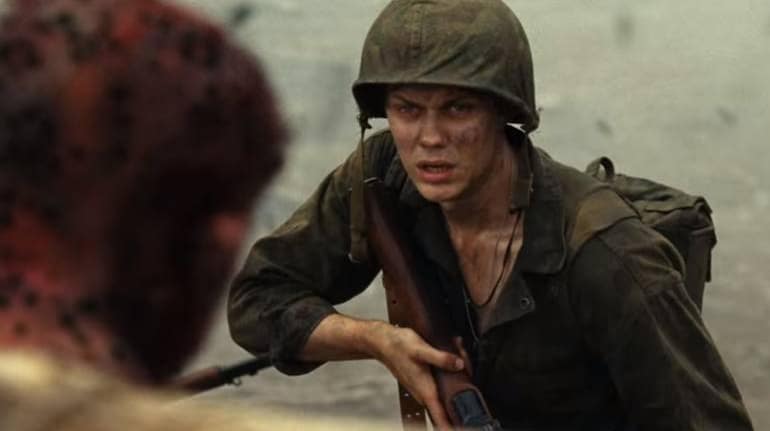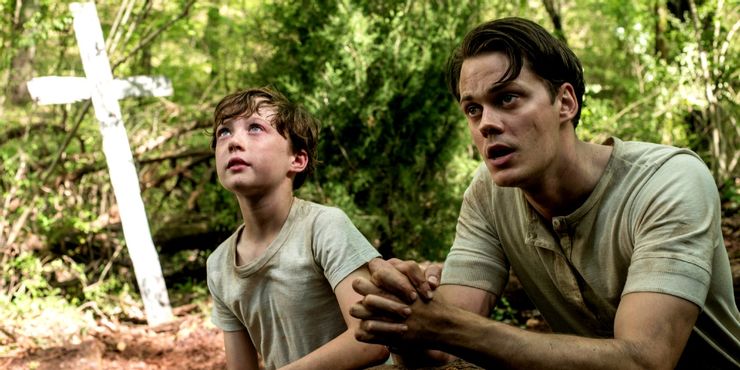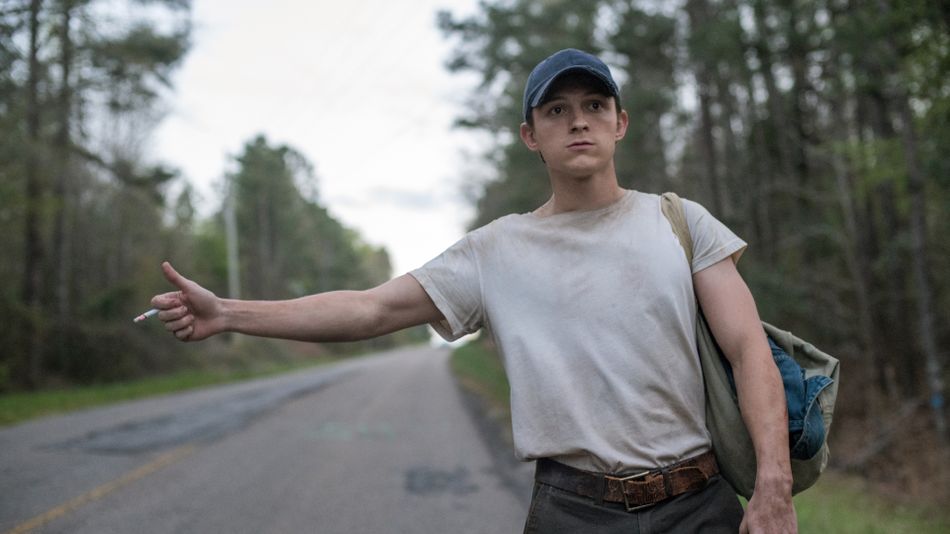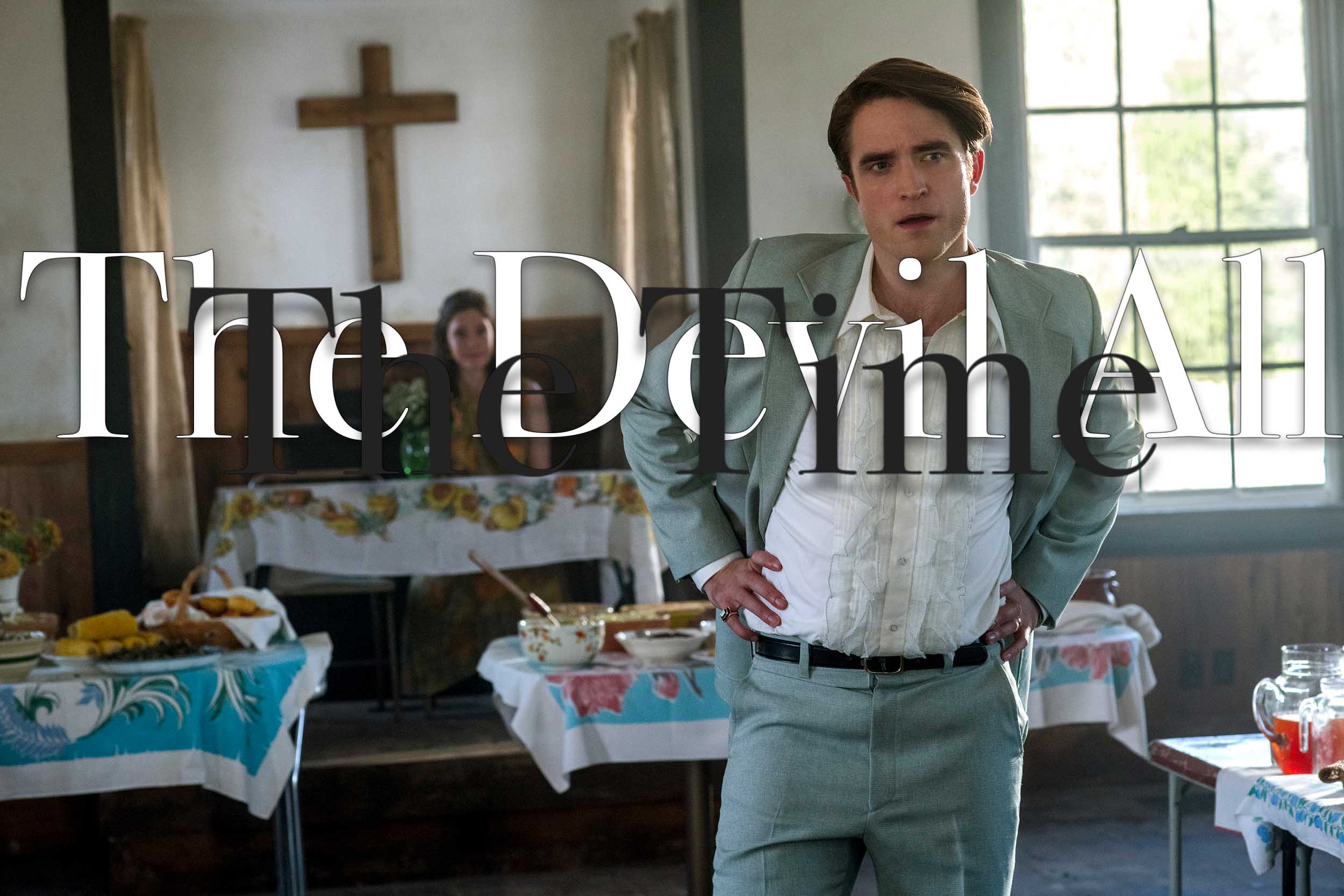The Devil All the Time Movie Explained. Today’s going to be a little different. Normally, here at THiNC., I go hunting for crazy, mindjob kind of movies that will rattle your skull and keep you thinking way long after the lights come up. And today, man, I’ve got a humdinger of a movie for you. All the Devil All the Time from Netflix will set your soul on fire and leave you for dead along a back country road if you aren’t careful. But I also am working on writing a book. In this book, I have this theory that is a little convoluted, but basically – Hollywood, in their making of movies, follow a system of complicated rules for what the protagonist can and cannot do. The rules are chiseled into tablets of marble. These tablets are read, and genuflected to by the powers that be. Why? Because if they forsake these well-known traditions, they will be cast outside the all important ring of profit.
Well, today, I will use the movie The Devil All the Time to explain how these rules work. Or one small section of these rules anyway. Just enough of them anyway to show you how these Marble Tablets work. OK? But first, what is this movie The Devil All the Time?
It’s not a movie for the faint of heart. I mean, yeah… just trust me on this one. This is just not for you if you read “faint of heart” and you thought, maybe it’s not that bad? It’s a rifle butt to the face. A bag of spiders poured on your face to prove that God has healed you from your fear of said spiders. Rape. Abuse. It’s manipulation and gaslighting. This movie is really, ultimately about evil and how it likes to masquerade through church pews, communions, and prayer altars.
So, yeah, hopefully I’ve warned off the right people, and excited the right people. Don’t get me wrong, I loved this movie. But you have to be the right kind of messed up for this one. And thankfully, I’m just that kind of messed up! hahaha. And from here on out, the rest of this post will be 100% spoilers. Worse, we’ll go behind the movie itself, and discuss the inner workings of movies like this and how Hollywood works when they get started on crafting a film of this nature.
The Devil All the Time Movie Walkthrough
The one rule to rule them all is that the hero must be likable. That’s it. But, oh, I wish it were simple. Because after that, it gets all kinds of complicated. And I’m still feeling my way around in the dark as I find new rules, and scribble them in my notebook before going back to feeling my way along some more. After that, we expect our heroes to be moral – to carry the morés that we expect of each other. Aka, don’t cut in line, don’t lie, don’t cheat, don’t steal. “But heroes lie, cheat, steal, all the time!!” Do they now? Maybe possibly before they start their hero’s journey – but not after. And then, from then on, it will all be for a good cause.
Which brings us to the story The Devil All the Time. The movie begins with two star-crossed towns, Coal Creek, West Virginia, and Knockemstiff, Ohio. Our entropic spiral will rapidly rotate back and forth between these two small towns. But our story of desolation’s begins in the Solomon Islands, during World War II. It starts with Willard Russell (played by Bill Skarsgård) stumbling upon the crucified body of Miller Jones. He’s been scalped, crucified, and left for dead. And Willard puts the man out of his agony by putting a bullet in his head. And that, my friends, is how you setup a movie like this one. But we have a generation to go before we find our hero. He’s coming though.

Fast forward to Meade, Ohio, on his way back home to Coal Creek where Willard falls in love with a waitress, Charlotte Russell (played by Haley Bennett – Swallow, The Girl on the Train). Three years later, our Willard and Charlotte get married, move to Knockemstiff, and have a son named Arvin (enter our hero – played by Tom Holland, Locke, Lost City of Z). Simultaneously, we meet a man named Carl Henderson (played by Jason Clarke – Zero Dark Thirty), who is a recently unemployed photographer of sorts, and we watch as he meets his future wife, Sandy.
Enter Helen Hatton (played by Mia Wasikowska). Willard’s mother had promised to God that she would marry her son Willard to Helen if only He would bring him back from the war. But that goes all kinds of pear-shaped when Willard shows zero interest in Helen. Instead, Helen falls madly for the itinerant preacher Roy Laferty (played by Harry Melling, The Old Guard, and War of the Worlds) and his wild backwoods spirituality. Yeah, he’d be the one that poured spiders all over his face to prove that God had healed him from his fear of spiders. Anyway, one day, after getting viciously bitten by one of those spiders, and locking himself in a closet for a fortnight, he believes God has spoken to him. What would it be that God had said to him? Well, apparently, that he was to hand off their child Lenora (eventually played by Eliza Scanlen, Sharp Objects), to Willard’s mother. He then took his wife out into the woods and stabbed her in the neck. But wait. It’s okay! Really. Uh, why would that be okay? Well, because God had told Roy that she would come back from the dead.
But. Um. She doesn’t. She stays dead. So Roy flees, as one does after murdering your wife in the woods. Deciding he’d go back and get Lenora before running for it, he hitched a ride back. But is picked up by Carl and Sandy – who are, to Roy’s detriment, serial killers apparently. Serial killers who like to pose with their victims before killing them. Well, Roy doesn’t want to play along, and that just earns him a couple bullets, and a shallow grave. He’s never heard from again. But over time, Sandy begins to tire of Carl’s necrophiliac tendencies.
Jump back to Willard, his wife Charlotte and his son Arvin. Well, Willard, being an oddly religious, only in the sense that since coming home from the war, the only time he feels close to God is out in the woods. He sets up a prayer altar behind their new house, and tells Arvin about prayer. More importantly, Willard teaches Arvin that he needs to stand up to evil. To bide his time, and overturn violence with escalating levels of violence. Now Arvin, our hero, has our sympathies… correct? He has a deranged father, who suffers from fanatical religious ideas, and is corrupted from the get go. And yet, Arvin will use these horrible teachings from his father as a foundation for good, in spite of his terrible beginnings.
Now, unfortunately, Arvin’s mother is diagnosed with cancer, and it sends Willard over the deep end. Constantly praying at their outdoor prayer altar. And worse, Willard decides that in order to get the attention of God, he should give a sacrifice. And so Willard chooses Arvin’s dog, Jack. (In the book I am writing, an ENTIRE CHAPTER will be focused on this one simple rule… never, never, ever, kill a pet. Killing a dog, or a cat, is one of the fastest, and surest ways to get yourself a super quick exit from a movie.) He kills the dog, and then prays that God will heal his wife. But after Charlotte dies, and is buried…he commits suicide out at the prayer altar. Leaving Arvin alone, to fend for himself. Now, Sandy’s brother, Lee Bodecker (played by Sebastian Stan, I, Tonya, and Destroyer) is the town’s corrupt cop. Lee ships Arvin off to live in Coal Creek, along with Lenora and his grandmother Emma.
Lenora, Arvin, and Grandma (along with another of her sons Earskell) scratch a life out for themselves, and seem to be doing fairly well, considering all the horror of their beginnings. (What with Lenora’s mother being murdered by her father, and her father being killed by Carl and Sandy. And Arvin’s mother dying at the hands of cancer, and his father dying at the hands of the buck knife in his own hand.) Enter the new preacher of the town, Reverend Preston Teagardin (played by Robert Pattinson, The King, Lighthouse, oh, and a million and one Twilight movies) who quickly weasels his way into the town and the church. (Possibly his greatest role yet, my skin crawled just watching him.) Eventually, he weasels his way into Leonora’s pants, while Arvin is out beating her regular abusers senseless. You see, our hero, Arvin, regularly stands by Leonora’s side as she prays at her mother’s grave. He watches out for Leonora, and attacks those who ridicule her. And right now? He puts several boys in the hospital after they refused to listen to his advice to leave her alone. (Enter the idea of the Just War theory. We’ll get to that later, trust me.)
But now we have Leonora pregnant, and the new pastor preaching on the dangers of delusions. Christ, apparently, was delusional in the desert, playing a game with Satan, who was determined to keep Him from saving us. Thankfully Christ didn’t believe the delusions. And we shouldn’t believe the delusions. Right? Or maybe mister slick is prepping to denounce Leonora’s “lies.” Nah. He couldn’t be that callous. THAT HAS NEVER HAPPENED IN THE HISTORY OF CHRISTENDOM. (Sorry, if that comment broke your sarcasm meter – yeah, that was sarcasm. And as a Christian, I unreservedly apologize on behalf of all slick preachers who have abused, defiled, and defaced the innocent, the confused, and needy.) But instead of calling out Preston Teagardin for his abuse… abuse of trust, abuse of position, abuse of power, abuse of the susceptible…. she heads out to the barn and puts a rope around her neck.
Now, something interesting happens in that barn, with the narrator from the book, and with the theology of that moment. We have sort of taken the narrator as a sort of God-like perspective, one who winnows out the lies, the hate, and the obvious misdeeds of the characters. But at this moment, the narrator fails us horribly. And it’s worse in that it is attempting to give Leonora a pass. A pass she doesn’t even need to be given. So, here’s the setup. She gets on the bucket, rope on her neck, and at the last second, she bails out. Right? She nopes the heck out of this suicide. But simultaneously slips. So the narrator let’s us know that it was an accident. Here’s how it plays out in the book, “As the rope slowly squeezed her windpipe shut, she became more frantic, clawing at her neck with her fingernails. Her face turned purple. She was vaguely aware of urine running down her legs. The blood vessels in her eyes began to burst, and everything got darker and darker. No, she thought, no. I can have this baby, God. Maybe I can just leave this place, go away like my daddy did. And then I can just disappear.”

But the screenplay writers, Antonio Campos and Paulo Campos (who I’ve asked about this detail – we’ll see if they respond) chose to deviate with the book. Absolve her in the eyes of the viewer, and the larger church. But, she is obviously attending some form of Reformed church. The book names the church as “Coal Creek Church of the Holy Ghost Sanctified,” which is about as reformed a church name as it gets. Here’s the point. Leonora’s family and church would have judged her for her suicide, for sure. But theologically, the church, of all places, should have cut her some slack (OK, that pun was unintended… but I’m laughing all the same.) You know? Because from an Evangelical standpoint, salvation isn’t a matter of forgiveness based on confession. Forgiveness is given once and for all at the point of salvation. And, for sure, our Pious Leonora, though she fell under the spell of the horrible Preston Teagardin, she was taken advantage of. And if, in a moment of weakness, she committed suicide…God would understand. She would not have been hell-bound for one simple mistake. I say all this, because it feels like the Director and Screenplay author inadvertently brought a Roman Catholic feel to the proceedings. Or maybe this is a secular Hollywood interpretation of how “religion” handles suicide. Seems like there is a lot here to mine. (Hahah, and sure enough, I asked Paulo about this moment in the screenplay and he gave me a very in depth answer (at least for Twitter anyway. Quick note, I de-twittered this exchange.)
THiNC. – “Hey there Paulo! Theological question from your brilliant movie. Curious why the screenplay went out of the way to say that Leonora’s hanging was an accident? As opposed to the book, which states she instantly regretted it? Is the screenplay attempting to absolve her of an unpardonable sin? Is that the intent here? I would assume that her church, being reformed, wouldn’t assume suicide a damnable offense. No? Great movie by the way.”
Paulo Campos – “Appreciate the question. Shortish answer is that this is a pivotal point about her death in the novel (Ch.36) and sets up Arvin’s return to Ohio. In general the narrator adds to the characters’ inner lives. And it was important for this nuance from the book be clear before the Coal Creek sheriff tells Arvin that Leonora was pregnant. I like the question because it’s really the edge of what the narrator is capable of. I see that line as the narrator speaking from Leonora’s or Emma’s view and not God.”
Regardless, this brings us back to our hero. He’s been doing his best in his attempts to keep it all together for his cobbled together family. And out of this waste bin of characters, he is the only redeeming one in the bunch. Sure, his idea of justice is generally a bit too preventative, and too corporeal. But man, he is a shining angel compared to literally anyone one else in this god forsaken wasteland. See? Likable. He’s likable because of his circumstances, and his response to those circumstances. He’s likable because while this film is a film of extremes, The Abusers, and the Abused, Arvin is the single soul attempting to right the wrongs, stop the abuse, and speak out for the downtrodden.
Now, Arvin, who was given his father’s Luger from the war from his uncle Earskell, takes that pistol to go meet with the great Reverend Preston Teagardin. But, unbeknownst to the clever Reverend, Arvin has been following his every move over the last couple weeks. He watches as he abuses another redheaded congregant. Then he watches as he discards her underwear in the field like so much refuse. And he realizes that when the local sheriff informs him that his sister was pregnant, it was this news that sent Leonora over the precipice. That the one person in the community that she should have been safe with, was the one person that caused her to die. But notice this one detail. Preston, jumps, lunges, makes a play for the gun, and Arvin shoots the preacher dead. Back to our likability details – the Star Wars Greedo shot first, debate is at the heart of this problem. If Arvin shoots, unprovoked, he is a murderer. But if it is justified in response to a threat, we allow him off the hook. Especially after what he’s done to Leonora, no? But it won’t do to have our heroes running around our story murdering people left and right without cause – even in the face of appalling details like that of Preston’s. Rape vs. Murder? No, our Arvin needed to be threatened in order to pull the trigger. And after he runs, he decides he’s going to head back to his family’s old home.
Along the way though, our hero runs into Carl and Sandy, the serial killers. I will say this, the book and the movie run extremely close to each other. But we learn a lot more about what this Carl and Sandy are all about, and it’s pure evil. Like a rolling cloud of locust denuding and pillaging the countryside everywhere they go. So our hero’s connection with these two is nothing more than the hand of God turning the wheel of judgement. Arvin, sensing something is up when the couple pull off the road to pee, and watch the sunset. Arvin ends up shooting Carl and ending up in a Mexican standoff with Sandy. Sandy, pulls the trigger, and ends up causing Arvin to shoot her simultaneously. But Sandy’s gun had been loaded with blanks. Why? You could either see that as Carl’s insane level of distrust, or you could see that as the hand of God protecting Arvin. You probably wouldn’t be wrong either way.
Jump to Lee, the newly minted sheriff of Knockemstiff who is still just as corrupt and horrid as ever. There’s been some chaos between him and his sister – who happens to be Sandy – did I mention that already? So there is some sort of root of evil driving straight through the root of this family – heck, which is true for pretty much anyone in this story. Anyway, after Lee learns that his sister and her husband have been killed by a nine millimeter gun…and that Arvin is running around loose with a Luger after having killed a preacher, he puts two and two together. And as the sheriff is the same guy who picked up Arvin as a child after his father’s suicide, he knew right where Arvin would be heading. Which makes sense because this is the hero’s journey. It’s inevitable.

But Arvin is out at his old home to pay remembrances to his father, or even his mother…instead, he’s there to find his childhood dog’s bones. “Who will bury Jack?” Arvin had asked Lee as he was taking him off the property, never to return until just now. Because, remember, the one true amorality is the murdering of a pet in a Hollywood movie. It’s as if Hollywood has an inverted hierarchy of Maslow’s Needs – instead, it’s a hierarchy of likability. And murdering a pet is literally the bottom rung. BUT! Having your dog murdered instantly puts you at the top of the likability hierarchy. Why? Sympathy. All your sympathy are belong to you. Instant Karma. So right, where was I, oh yes… Arvin is burying Jack. Because of course our hero is. And that is when Lee, our crooked cop, is coming out to kill Arvin. WHY WOULD HE DO THAT?!??! Well, because Lee can’t have a witness on the loose, running around, telling everyone what his sister has been up to. Especially under his own nose! He’ll lose the next election.
So, in this corner, we have Arvin, avenging his sister’s death. And burying his dog. (Come on, the likability index broke for this guy.) And in the other corner, we have Lee, the sheriff that has been burning evidence that his sister is a serial killer. How is this going to go down? Well, Lee fires his shotgun, hits the log shielding Arvin, and Arvin buries a 9mm slug in Lee’s belly. Before he leaves, he plants evidence against Sandy and Carl in Lee’s jacket. And the movie ends, Arvin bums a ride towards Cincinnati, and Arvin is lost in thought thinking either about himself as a kid, or his own kid, desiring to get back to his grandmother, and family. Not having to go on the run. Because, it was a Just Cause killing. No!? But is he seeing himself as a child? Or is he seeing his future child? Or is he seeing his father as a child?? Interesting question. And with that, the film ends after having efficiently wiped every single character in the movie off the map. (Reminds me of those triangle games you find at The Cracker Barrel? You know the ones with the pegs? And if you do it perfectly, you jump pegs until you only have a single peg left? Yeah, that is the movie the Devil All the Time, and Arvin is our single, terminator peg.)
Thoughts on The Devil All the Time
As a Christian…you’d think I’d disdain a movie that tells the story of extraordinarily “pious” people doing extraordinarily evil things. But I personally don’t believe that Christianity is a religion, but rather a relationship. And if there are individuals who are crafting power out of Christ’s work, then they don’t understand what the Gospel is really all about, and should be stopped. Catholic Priests raping children? Burn it down. Jerry Falwell Jr’s engaging in sexcapades that take advantage of convenient pool boys? Burn that down too. And I think that that is what this film is 100% about. Sure, from a secular view point, maybe you walk away with the idea that the entirety of religion should be burnt down? Maybe? (And I actually, theologically, have no problem with that statement…and could back that without even a hint of remorse or theological equivocation. But I am sure there will be some Christians that will read that and disagree completely. Which is fine.)
But more importantly, the book. Do you see how this movie illustrates the likability laws of Hollywood? Arvin doesn’t steal. Doesn’t cheat. Arvin is kind to his sister, his grandmother and uncle, even in spite of the horrible hand he was delivered. The Luger given to him by his uncle, which was from his father, was his favorite gift ever. And he took what he learned from his father to heart. Extreme Justice.

Just War Theory and The Devil All The Time
Back in the thirteenth century, Aquinas developed this idea called the Just War theory which basically was just a codification of guidelines to guide civil society on proving whether or not going to war was sound. Logically follows. Right? I want your gold. No. Not a just war. I would like more space. No. Not a just war. A just war can only be waged (per Aquinas) as a last resort. And only then, after all non-violent options have been exhausted. And only then – after tiring levels of negotiation, and discussions, can a just war be carried out. Better yet, the violence used in the war must be proportional to the injury suffered.
Now, let’s consider Arvin. Arvin was ridiculed, and belittled by the kids in the school. He did nothing. But it was when his sister, Leonora, was all but raped by the bullies in the school that he made it really clear that he was not going to stand for what they did to her. And it was then that he sent a very clear message to each one to never touch her again. Then, after Leonora committed suicide, and he found out that she was pregnant that he investigated the pastor. Did his research. Learned what was going on. Then he confronted the pastor, and ultimately killed him as a result of his lies, and slander. Then, his rapid, thinking on his feet when it came to Sandy and Carl definitely saved not only his own life…but the lives of others that they might have gotten their hands on if given the chance to continue their reign of terror. And finally Lee. Lee was a selfish public servant. Which, is the definition of an oxymoron, no? Public servants should be altruistic, and considering the needs of the town above the needs of their own personal interest. But Lee was worse in that he knew about Carl, and Sandy. He knew the sick crap the two of them were into, and yet he turned a blind eye to it. Which, is the true height of evil. And even after they were dead, all he could think about was covering over their wrong doing solely to save himself. So, to have Arvin met out that justice was extremely satisfying. They had it coming!
But how often, in this day and age, does justice go undelivered? There was an enormous need for justice to be done in this movie. As a culture right now, we have a desperate need for justice to be done. The levels of self-dealing and self-interest in our government and in our society is ludicrous. What happened to the altruistic public servant? No, he dead. And so, to watch as Arvin takes stock of what is needed, and how he did what needed to be done is truly heroic. He moved within the bounds of Just War theory. His actions were in response to evil that couldn’t be talked down. He only acted because no one else did. How badly do we need that right now? I don’t need a superman to keep a building falling on me! I need an Arvin to dole out justice for those that are innately evil. (On a side note, RBG died yesterday – and to watch at how some are trampling on her life in an obvious push for power is really really sickening to me. We can be decent. People of our word. We can compassionate and thoughtful, even across the aisle. ESPECIALLY ACROSS THE AISLE! Gah. Enough.)
Arvin is my kind of super hero. You know I’m not a fan of Super Hero movies. But I really do see this as a truly special kind of super movie. One that pushes truth over lies. A hero movie that glorifies justice over evil.
BUT HE KILLED EVERYONE. Yes. He did. But he was kind as he did it. He didn’t go looking to kill Lee, Sandy, or Carl. And the preacher, some would argue had it coming. Did you guys see that news report when the father of a gymnast asked the judge if he can have five minutes with his daughter’s assailant in private. And the judge – obviously – denied the request. Two minutes? And then he rushed Nassar. The moving thing was how the deputies pinning him to the floor were comforting him. I get that. I really do. My personal prayer is that I would be forgiving. But we all get how this guy was feeling. And Arvin is basically the hand of justice that has been missing in our own society as the powerful continue to take advantage of the disadvantaged.
The perfect example of this was Arvin’s grandmother’s chicken livers. We knew she didn’t have money for better chicken cuts, or for beef. And yet, like the story of the widow’s mite…she gave everything she had. But Preston Teagardin? He looked at the plate…made a comment about how poor these people were that gave these chicken livers. And in order to save the rest of the congregation from the embarrassment of having to eat this food, he would sacrifice his own desires, and eat the chicken livers…”so no one else had to.” Such bald faced hypocrisy. And yet, we are watching these levels of selfishness happening all the time today. Wolves in sheep’s clothing. But I would like to remind you, the wheel’s of God’s justice move slowly, but grind exceedingly thin. Be careful what side of the line you choose to stand on. Are you considering the needs of the poor? The widow, the orphans? The downtrodden? The under-represented? Arvin was. I’m 100% team Arvin. And I think he should be given an entire chapter in the book that I’ll be writing about the Hollywood Hero. Can’t wait t show more of it to you guys.
Edited by: CY



